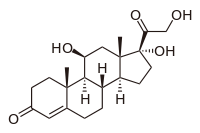
Photo from wikipedia
AIMS We aimed to evaluate the associations of mineralocorticoids with type 2 diabetes mellitus (T2DM) and glucose homeostasis among rural Chinese adults. METHODS A total of 2713 participants were selected… Click to show full abstract
AIMS We aimed to evaluate the associations of mineralocorticoids with type 2 diabetes mellitus (T2DM) and glucose homeostasis among rural Chinese adults. METHODS A total of 2713 participants were selected from the Henan Rural Cohort study. Serum mineralocorticoids were measured by liquid chromatography-tandem mass spectrometry. Logistic regression and restricted cubic splines were employed to evaluate the associations of mineralocorticoids with pre-diabetes and T2DM. Linear regression was implemented to assess the associations of aldosterone and 11-deoxycorticosterone with different markers of glucose homeostasis by different diabetes status. RESULTS Elevated aldosterone and 11-deoxycorticosterone were associated with an increased prevalence of pre-diabetes and T2DM (P < 0.05), with a nonlinear dose-response trend, but the association between 11-deoxycorticosterone and T2DM was no statistical significance after adjustment. A 100% increase in ln-aldosterone was associated with a 0.029 mg/dl higher fasting plasma glucose (FPG) and a 1.2% higher HOMA2-IR among those with normal glucose tolerance (NGT), and related to a 0.034 mg/dl lower FPG, a 1.1% higher HbA1c and a 1.3% higher HOMA2-β among individuals with pre-diabetes. A 100% increment in ln-11-deoxycorticosterone was associated with a 16% increase in HbA1c and a 5.6% decrease in HOMA2-β in participants with T2DM. CONCLUSIONS Higher aldosterone and 11-deoxycorticosterone are associated with T2DM risk and glucose homeostasis disorder among different diabetes status.
Journal Title: Journal of diabetes and its complications
Year Published: 2020
Link to full text (if available)
Share on Social Media: Sign Up to like & get
recommendations!